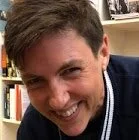Life Isn’t Binary
Dr Meg-John Barker on writing about queer issues, co-creating bi spaces, and sexual fluidity.
Dr Meg-John Barker has close to 20 years of experience researching bisexuality and related topics, and was the founder and chair of BiUK (the UK bi research group) for over a decade. They have also worked as a psychotherapist with bi and queer clients for 10 years.
MJ is now a full-time writer and podcaster, creating content about queer issues.
3 things you wish everyone knew about bisexuality?
It's majority rather than minority. Most people experience attraction to more than one gender over their lives.
Sexuality in general is fluid rather than fixed.
It only relates to one dimension of sexuality (gender of attraction) and there are many others. We can also separate out sexual vs. nurturant attraction - e.g. bisexual vs. biromantic. And we can separate solo vs. partnered attraction - e.g. what people fantasise about vs. what they do.
Why are you interested in research on bisexuality?
These days only because it informs my writing on sexuality for a general audience. In the past I was a bi activist, academic and therapist and it informed my work in all three areas.
What does your research explore?
I write and podcast about our relationships with ourselves, others, and the world, including themes around gender, sex, love, and mental health.
Most interesting facts from your research?
I would say the 2015 YouGov survey which found that…
half of young people are something other than 'exclusively heterosexual', with 43% in the non-binary area between heterosexual and homosexual.
Also Sari Van Ander's work locating sexuality fluidly across multiple dimensions, not just on this kind of Kinsey scale.
How do you define bisexuality?
Attraction to people of more than one gender (seems to be the most popular definition from bi people themselves).
What are the most pressing concerns within the bisexual community in 2020?
Acknowledging intersectional axes of oppression (particularly race, class, gender, and disability) and co-creating bi spaces on and offline which are accessible and welcoming to all.
Learning trauma-informed ways of managing conflict and difference within community.
Addressing mental health struggles and relationship abuse (both high in bi people)
What bi research would you like people to know about?
My other recent/forthcoming books include
Sexuality: A Graphic Guide
Gender: A Graphic Guide
How to Understand Your Gender
How to Understand your Sexuality.
Getting more personal…
Are you bi? Yes indeed
Does being bisexual change how you approach your work?
Yes given I have an inside perspective and have been part of the community.
Can you tell me a bit about your experience?
Everyone knows I'm bi given I've written about it so much personally and professionally. I've known since my late teens but it was only late twenties when I came into bi community and began being active and working in this area.
More about Meg-John Barker.
Twitter: @megjohnbarker

